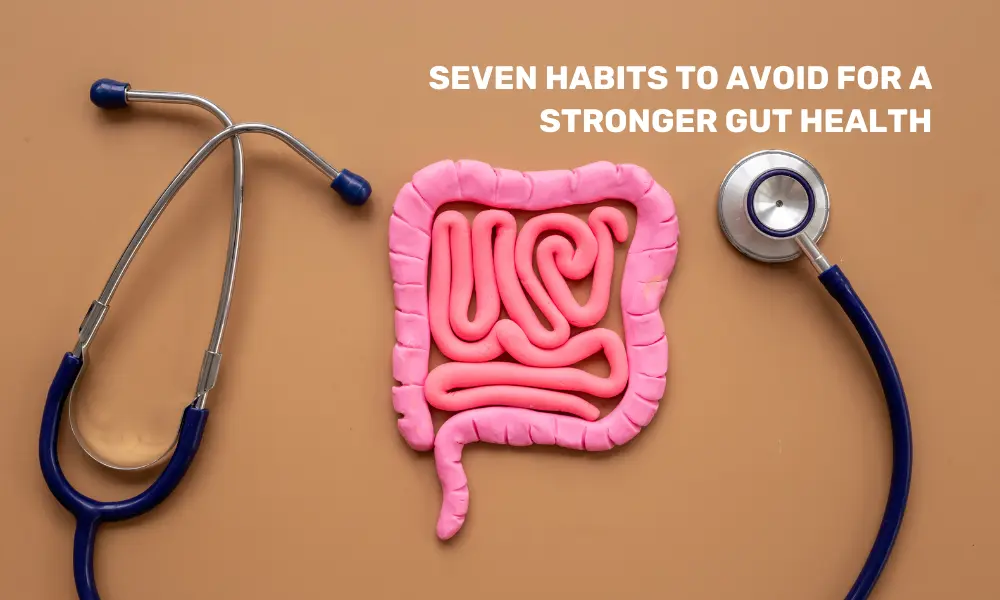We often blame spicy food or stress for tummy troubles, but the real culprits might be hiding in our daily routine. From skipping meals to sleeping odd hours, certain everyday habits can silently disrupt our digestive balance and impact our gut health.
Seven everyday habits that could be ruining your gut health without you even realizing it.
1. Chronic antacid use without indication
Regularly taking antacids without a proper indication can alter the natural acidity (pH) of the stomach, disrupting the balance of good bacteria and potentially affecting digestion and immunity. So, consult a specialist before taking an antacid next time.
2. Eating under stress
When you eat hurriedly or while stressed, your body shuts down the parasympathetic nervous system, the “rest and digest” mode, resulting in poor digestion and absorption of nutrients.
3. Suppressing bowel movement
Ignoring or delaying bowel movements frequently can impair the natural gastrocolic reflex, leading to constipation and other digestive problems by interrupting normal gut function.
4. Frequent snacking
Constantly snacking throughout the day disrupts the migrating motor complex (MMC), which is the gut’s natural cleansing wave between meals. This interference reduces the gut’s ability to clear out bacteria and waste, promoting bacterial overgrowth and digestive issues.
5. Chewing gum all day
Chewing gum for prolonged periods stimulates digestive enzymes unnecessarily, which can lead to bloating and confuse the gut-brain signals, disrupting normal digestion and causing discomfort.
6. Limited exposure to sunlight
Avoiding sunlight lowers our Vitamin D levels, which is an essential nutrient for maintaining a healthy gut barrier and supporting immune function.
7. Taking multivitamins on an empty stomach
Consuming multivitamins, especially those rich in iron and B vitamins, without food can irritate the sensitive lining of the stomach and cause nausea, discomfort, or even digestive upset.
These habits might seem trivial, but their impact on our gut health is big. Therefore, avoid these habits and adopt a healthy regimen to build strong gut health.
To improve gut health, focus on diet, lifestyle, and stress management. Consume a diverse diet rich in fiber, incorporate fermented foods, stay hydrated, and minimize processed foods and sugars. Manage stress, get proper sleep, and exercise regularly. Consider probiotic supplements and be mindful of antibiotic use. Here is a detailed checklist to ensure good gut health.
-
-
Eat more fiber as it acts as food for gut bacteria, promoting their growth and health. Sources include fruits, vegetables, legumes, and whole grains.
-
-
-
Include fermented foods as these contain probiotics, which improve gut health.
-
-
-
If diet alone isn’t sufficient, consider taking a probiotic supplement, but consult with a healthcare professional first.
-
-
-
Limit intake of sugary and processed foods as they negatively impact gut health by promoting the growth of harmful bacteria and causing inflammation.
-
-
-
Keep a good intake of water throughout the day as it is essential for nutrient absorption and overall digestive function.
-
-
-
Eat mindfully, pay attention to your food while eating, chew thoroughly, and avoid eating on the go to improve digestion.
-
-
-
Stress can negatively impact gut health, so find healthy ways to manage it.
-
-
-
Sleep is crucial for gut repair and overall health. Aim for at least 7-9 hours of quality, undisturbed sleep every day.
-
-
-
Physical activity can improve gut motility and promote the growth of beneficial bacteria.
-
-
-
Antibiotics can disrupt the balance of gut bacteria, so avoid consuming them regularly. Use them only when necessary and as prescribed by a doctor.
-
Gut health is the foundation of our overall well-being. Therefore, avoid habits that harm gut health and adopt healthy habits for a stronger gut health. Remember, if you have persistent digestive problems, it’s important to consult with a specialist to rule out any underlying conditions.
Disclaimer: This article is meant for informational purposes only and must not be considered a substitute for professional advice.





